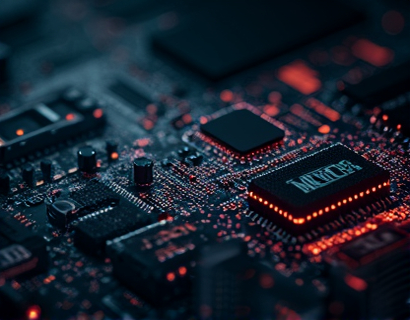Smart Contract Automation: Revolutionizing Business Payments and Financial Obligations
In the rapidly evolving landscape of financial technology, smart contract automation stands out as a transformative force, particularly in the realm of business payments and financial obligations. This technology harnesses the power of blockchain to automate and streamline various financial processes, offering unprecedented levels of security, transparency, and efficiency. For businesses seeking to enhance their financial management, smart contract automation presents a compelling solution that simplifies complex transactions and reduces the risk of errors and fraud.
Understanding Smart Contracts
At its core, a smart contract is a self-executing contract with the terms of the agreement directly written into code. These contracts run on a blockchain, a decentralized ledger that records all transactions across a network of computers. The code defines the rules and conditions that must be met for the contract to execute, ensuring that all parties adhere to the agreed terms without the need for intermediaries.
One of the key advantages of smart contracts is their immutability. Once deployed, the terms of the contract cannot be altered, which enhances trust and reduces the risk of disputes. This feature is particularly valuable in financial transactions where reliability and consistency are paramount.
Automating Dividend Distribution
Smart contract automation is especially beneficial for automating the distribution of dividends. Traditional dividend payouts involve multiple steps, including calculation, approval, and disbursement, each of which can be time-consuming and prone to errors. With smart contracts, these processes can be automated end-to-end.
For instance, a company can program a smart contract to automatically calculate and distribute dividends to shareholders based on predefined criteria, such as the number of shares owned. Once the conditions are met, the contract executes the payment instantly and transparently, with a record of the transaction stored on the blockchain. This not only speeds up the process but also ensures that all shareholders receive their payments accurately and on time.
Streamlining Earnings and Scheduled Payments
Beyond dividends, smart contracts can also streamline the distribution of earnings and scheduled payments. For businesses with recurring payments, such as salaries, rent, or supplier invoices, smart contracts offer a seamless solution. By setting up a smart contract with the payment details and schedule, the transaction can be executed automatically at the specified intervals.
This automation reduces the administrative burden on finance teams, allowing them to focus on more strategic tasks. Moreover, it minimizes the risk of missed payments or delays, ensuring that all financial obligations are met promptly and reliably. For example, a company can use a smart contract to automatically transfer funds to suppliers on a monthly basis, with the contract checking the balance and executing the transfer when the date arrives.
Enhancing Security and Transparency
Security and transparency are fundamental aspects of smart contract automation. The blockchain's decentralized and immutable nature ensures that transaction records cannot be altered or tampered with, providing a high level of security against fraud and cyberattacks. Each transaction is verified by multiple nodes in the network, adding an additional layer of security.
Transparency is another significant benefit. All parties involved can view the transaction history and the current state of the contract, fostering trust and accountability. This level of transparency is particularly valuable in financial obligations where clear and verifiable records are essential.
Reducing Costs and Increasing Efficiency
By automating financial processes, businesses can significantly reduce operational costs associated with manual transactions. Intermediaries such as banks and payment processors often charge fees for their services, which can add up over time. Smart contracts eliminate the need for these intermediaries, leading to cost savings.
Efficiency is also greatly enhanced. Automated processes reduce the time and effort required to manage financial obligations, allowing businesses to operate more smoothly. For instance, instead of manually processing and reconciling payments, finance teams can rely on smart contracts to handle these tasks, freeing up resources for more value-added activities.
Case Studies and Real-World Applications
Several companies have already leveraged smart contract automation to optimize their financial processes. One notable example is a major multinational corporation that implemented smart contracts for its global supplier payments. By automating these payments, the company reduced transaction times from weeks to seconds and cut down on administrative costs by over 50%.
Another example is a financial services firm that uses smart contracts for the distribution of investment returns. The firm reported a significant reduction in the time and effort required to process and distribute returns, with all transactions being executed accurately and transparently.
Challenges and Considerations
While the benefits of smart contract automation are clear, there are also challenges and considerations that businesses should be aware of. One of the primary challenges is the technical complexity of implementing smart contracts. Businesses need to have a solid understanding of blockchain technology and contract programming to develop and deploy effective smart contracts.
Another consideration is the regulatory environment. As smart contract technology is still relatively new, regulations vary by jurisdiction. Businesses must ensure compliance with local laws and regulations, which may require consulting with legal experts.
Additionally, while smart contracts enhance security, they are not immune to all risks. Bugs in the code or vulnerabilities in the blockchain can pose security threats. Therefore, thorough testing and auditing of smart contracts are essential to mitigate these risks.
Future Trends and Innovations
The future of smart contract automation in financial management looks promising, with ongoing developments and innovations set to enhance its capabilities. One area of focus is the integration of smart contracts with other blockchain-based technologies, such as decentralized finance (DeFi) platforms, to create more comprehensive and sophisticated financial solutions.
Another trend is the development of user-friendly tools and platforms that simplify the creation and management of smart contracts for non-technical users. These tools aim to democratize access to smart contract technology, making it more accessible to a broader range of businesses.
Furthermore, the exploration of cross-chain interoperability is gaining traction, allowing smart contracts to operate across different blockchain networks. This could lead to more flexible and versatile financial solutions, enabling businesses to leverage the strengths of multiple blockchains.
Conclusion
Smart contract automation represents a significant leap forward in financial management, offering businesses a powerful tool to streamline payments and financial obligations. By automating complex processes, enhancing security, and increasing efficiency, smart contracts provide a robust solution for modern businesses looking to optimize their financial operations. As the technology continues to evolve, it is poised to play an increasingly important role in the financial landscape, driving innovation and efficiency across industries.











































